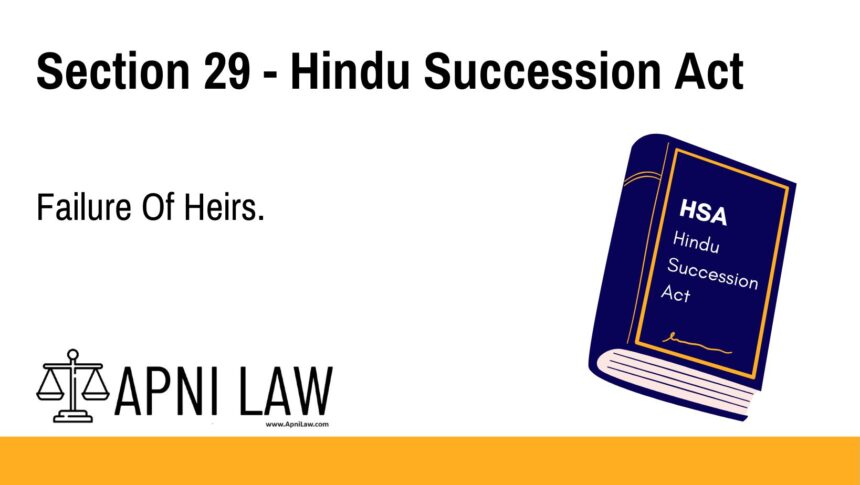Code: Section 29 – Failure of Heirs
If an intestate has left no heir qualified to succeed to his or her property in accordance with the provisions of this Act, such property shall devolve on the Government; and the Government shall take the property subject to all the obligations and liabilities to which an heir would have been subject.
Explanation of Section 29 of the Hindu Succession Act
Section 29 of the Hindu Succession Act, 1956 addresses the situation where an intestate (a person who dies without a will) has no heirs qualified to inherit their property according to the provisions of the Act. In such cases, the property will pass to the Government. The Government will assume ownership of the property, but it will also inherit any liabilities or obligations that would have been the responsibility of the heirs.
Key Points:
- Government as Heir: If no qualified heirs are available, the property goes to the Government.
- Liabilities and Obligations: The Government assumes not only the property but also the obligations and liabilities that the deceased person’s heirs would have inherited.
Tamil Nadu Amendments to the Hindu Succession Act
Section 29-A: Equal Rights to Daughters in Coparcenary Property
The Tamil Nadu Amendment inserted Chapter II-A to the Hindu Succession Act, particularly Section 29-A, which grants daughters equal rights in coparcenary property, thus ensuring gender equality in matters of inheritance in joint Hindu families governed by the Mitakshara law.
- Daughters as Coparceners: Daughters will now have the same rights in coparcenary property as sons, including the right to claim by survivorship.
- Partition Rights: At a partition, a daughter will receive the same share as a son.
- Ownership Rights: The property that a daughter inherits will be considered coparcenary property, allowing her to dispose of it via a will.
- Exclusion of Pre-married Daughters: The provisions do not apply to daughters married before the commencement of the Hindu Succession (Tamil Nadu Amendment) Act, 1989.
Section 29-B: Interest to Devolve by Survivorship on Death
If a female Hindu, who has an interest in Mitakshara coparcenary property, dies after the commencement of the Tamil Nadu Amendment Act, her interest will devolve by survivorship to the surviving members of the coparcenary, unless she leaves behind children or grandchildren. In such cases, the interest will devolve under the provisions of the Hindu Succession Act.
Section 29-C: Preferential Right to Acquire Property in Certain Cases
This amendment provides a preferential right to heirs to acquire the property of a deceased intestate when the property devolves under Section 29-A or 29-B. If multiple heirs propose to acquire the property, the one who offers the highest consideration will be given preference.
Common Questions and Answers on Section 29 and the Tamil Nadu Amendments
1. What happens if there are no heirs to inherit property?
In the absence of qualified heirs, the property devolves to the Government as per Section 29 of the Hindu Succession Act.
2. Does the Government inherit the property without any liabilities?
No. The Government inherits the property subject to all obligations and liabilities that would have been the responsibility of the heirs.
3. How does Section 29-A affect daughters in a Hindu family?
Section 29-A ensures that daughters in a Joint Hindu Family governed by the Mitakshara law have equal rights to coparcenary property, including the right to claim by survivorship.
4. What happens when a female Hindu coparcener dies?
If the female Hindu coparcener dies after the Tamil Nadu amendment, her interest in the Mitakshara coparcenary property devolves by survivorship, unless she leaves children or grandchildren, in which case the property devolves through succession.
5. How is the transfer of coparcenary property handled?
If an heir wishes to transfer their interest in the coparcenary property, the other heirs have the preferential right to acquire it, as outlined in Section 29-C.
Conclusion
Section 29 of the Hindu Succession Act ensures that when there are no heirs to inherit the property of a deceased person, the property passes to the Government. The Tamil Nadu Amendments, particularly Sections 29-A, 29-B, and 29-C, introduce significant changes that promote gender equality and provide clearer rules on the transfer and devolution of property in joint Hindu families.
For more legal insights on inheritance and property laws, visit ApniLaw — your trusted source for up-to-date legal information.








